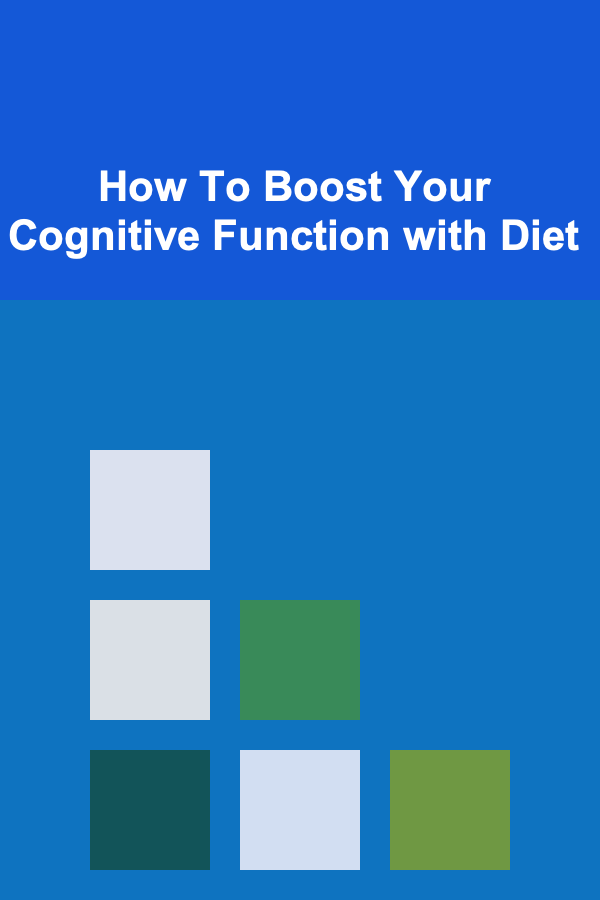
How To Boost Your Cognitive Function with Diet
ebook include PDF & Audio bundle (Micro Guide)
$12.99$10.99
Limited Time Offer! Order within the next:

In an age where mental acuity is more valued than ever, and cognitive decline poses a growing global challenge, the profound connection between what we eat and how our brains function is becoming increasingly clear. Our diet is not merely fuel for our bodies; it is the raw material from which our brains are built, maintained, and optimized. From enhancing memory and focus to protecting against neurodegenerative diseases, the food choices we make daily hold immense power over our cognitive destiny. This comprehensive exploration delves into the intricate mechanisms by which nutrition impacts brain health, identifies key dietary components that serve as cognitive enhancers, and offers practical strategies for cultivating a brain-boosting eating pattern.
The Brain: An Energy-Hungry, Nutrient-Demanding Organ
Weighing only about two percent of our total body weight, the brain consumes a disproportionate 20-25% of the body's total energy budget. This remarkable energy demand underscores its constant activity and the critical need for a steady supply of high-quality nutrients. The brain is not a static organ; it is a dynamic, constantly remodeling structure, engaging in neurogenesis (the birth of new neurons), synaptogenesis (the formation of new connections), and myelin repair. Each of these processes requires specific building blocks and co-factors derived directly from our diet. Without optimal nutrition, the brain struggles to maintain its structure, execute its functions efficiently, and protect itself from damage. Chronic deficiencies or imbalances can manifest as cognitive fogginess, poor concentration, memory lapses, and, over the long term, increased susceptibility to more severe neurological conditions.
The Brain-Diet Connection: Beyond Simple Fuel
The relationship between diet and brain function is multifaceted, extending far beyond the provision of calories. It encompasses:
- Structural Integrity: The brain is primarily composed of fat (approximately 60%), with a significant portion being essential fatty acids like omega-3s. These fats are critical for maintaining cell membrane fluidity, which is vital for efficient neurotransmission.
- Neurotransmitter Synthesis: Neurotransmitters---the chemical messengers that facilitate communication between neurons---are synthesized from amino acids derived from dietary protein. For example, serotonin, associated with mood and well-being, is synthesized from tryptophan; dopamine, linked to reward and motivation, from tyrosine.
- Energy Production: Glucose is the primary fuel for the brain. However, the source and stability of glucose supply matter immensely. Complex carbohydrates provide a slow, steady release, preventing energy crashes that impair cognitive function.
- Protection Against Damage: The brain is particularly vulnerable to oxidative stress and inflammation due to its high metabolic rate and lipid content. Antioxidants and anti-inflammatory compounds found in food play a crucial role in neutralizing free radicals and dampening inflammatory responses.
- Gut-Brain Axis: Emerging research highlights the profound influence of the gut microbiome on brain health. The trillions of microorganisms in our gut produce neuroactive compounds, influence inflammation, and regulate the integrity of the gut lining, all of which can impact brain function and mood.
- Gene Expression and Epigenetics: Nutrients can directly influence gene expression, turning on or off genes associated with brain health, plasticity, and disease susceptibility. This epigenetic influence means our diet can literally reprogram our brain's future.
Essential Dietary Components for Peak Cognitive Performance
To optimize cognitive function, a dietary approach must focus on nutrient density and the synergy between various food components. Here, we delve into the most impactful categories:
1. Omega-3 Fatty Acids: The Brain's Preferred Fat
Omega-3 polyunsaturated fatty acids (PUFAs), particularly docosahexaenoic acid (DHA) and eicosapentaenoic acid (EPA), are non-negotiable for brain health. DHA is a major structural component of brain cell membranes, making up about 20% of the dry weight of the cerebral cortex. Its presence ensures the fluidity of neuronal membranes, which is crucial for efficient signal transmission and neurotransmitter binding. EPA, while less abundant in brain structure, plays a vital role in reducing inflammation and promoting cardiovascular health, which indirectly supports brain blood flow and overall function.
Mechanisms of Action:
- Structural Integrity: DHA is incorporated into neuronal cell membranes, affecting their fluidity and permeability, which are critical for nerve impulse transmission.
- Anti-inflammatory Properties: EPA and DHA are precursors to potent anti-inflammatory molecules called resolvins and protectins, which help quell neuroinflammation---a key contributor to cognitive decline.
- Neurogenesis and Synaptic Plasticity: Omega-3s support the growth of new brain cells (neurogenesis) and enhance synaptic plasticity, the brain's ability to form and strengthen connections, which is fundamental for learning and memory.
- Blood Flow: They improve endothelial function and reduce platelet aggregation, leading to better blood flow to the brain, ensuring adequate oxygen and nutrient delivery.
Food Sources:
- Fatty Fish: Salmon, mackerel, sardines, herring, and anchovies are excellent sources of DHA and EPA. Aim for at least two servings per week.
- Algae-based Supplements: For vegetarians and vegans, algae oil provides direct DHA and sometimes EPA.
- Plant-based ALA: While alpha-linolenic acid (ALA) from flaxseeds, chia seeds, and walnuts can be converted to EPA and DHA, the conversion rate is often low (less than 5-10%), so direct sources are preferred.
2. Antioxidants: Defenders Against Oxidative Stress
The brain's high metabolic rate, coupled with its rich lipid content, makes it highly susceptible to oxidative stress---an imbalance between free radical production and the body's ability to counteract their harmful effects. Free radicals can damage brain cells, proteins, and DNA, contributing to inflammation and neurodegeneration. Antioxidants, found abundantly in fruits, vegetables, and certain beverages, neutralize these damaging molecules.
Key Antioxidants for Brain Health:
- Flavonoids: A large group of plant compounds found in berries, apples, citrus fruits, dark chocolate, tea, and red wine. They cross the blood-brain barrier and accumulate in brain regions associated with learning and memory. They enhance neurogenesis, improve cerebral blood flow, and protect neurons from oxidative damage.
- Vitamin E: A fat-soluble antioxidant particularly important for protecting brain cell membranes. Found in nuts, seeds, spinach, and avocado.
- Vitamin C: A water-soluble antioxidant that recycles vitamin E and helps protect against oxidative damage. Abundant in citrus fruits, bell peppers, broccoli, and strawberries.
- Carotenoids: Pigments found in colorful fruits and vegetables (e.g., beta-carotene in carrots, lutein and zeaxanthin in leafy greens) that have antioxidant and anti-inflammatory properties, particularly beneficial for eye health, which is linked to cognitive function.
- Polyphenols: A broad category including flavonoids, lignans, and phenolic acids, found in tea, coffee, grapes, and many vegetables. They contribute to antioxidant defense and modulate the gut microbiome.
Food Sources:
- Berries: Blueberries, strawberries, raspberries, and blackberries are rich in anthocyanins, potent flavonoids linked to improved memory and reduced cognitive decline.
- Leafy Green Vegetables: Spinach, kale, collard greens are packed with vitamins E and K, lutein, and folate, all crucial for brain health.
- Dark Chocolate/Cocoa: High in flavonoids, which can improve blood flow to the brain and enhance cognitive function. Choose varieties with at least 70% cocoa.
- Green Tea: Contains catechins, particularly EGCG, which have strong antioxidant and neuroprotective effects, and L-theanine, which promotes relaxation and focus.
- Colorful Vegetables: Bell peppers, tomatoes, broccoli, and carrots provide a spectrum of antioxidants.
3. B Vitamins: The Brain's Energy & Neurotransmitter Catalysts
The B-vitamin complex plays a fundamental role in numerous brain processes, particularly energy metabolism and neurotransmitter synthesis. Deficiencies in certain B vitamins can lead to cognitive impairment, mood disorders, and even neurological damage.
Key B Vitamins for Brain Health:
- Folate (B9): Essential for DNA synthesis and repair, and for the metabolism of homocysteine, high levels of which are associated with increased risk of cognitive decline and Alzheimer's disease. Found in leafy greens, legumes, fortified grains.
- Vitamin B6 (Pyridoxine): Crucial for the synthesis of several neurotransmitters, including serotonin, dopamine, and GABA. Also involved in homocysteine metabolism. Found in poultry, fish, chickpeas, bananas.
- Vitamin B12 (Cobalamin): Indispensable for nerve sheath (myelin) formation, DNA synthesis, and red blood cell production. Deficiency can lead to severe neurological symptoms. Primarily found in animal products (meat, fish, dairy, eggs), making supplementation critical for vegans.
- Vitamin B3 (Niacin): Involved in energy production within brain cells and DNA repair. Found in meat, fish, nuts, and legumes.
Food Sources:
- Whole Grains: Brown rice, oats, quinoa provide B vitamins and sustained energy.
- Legumes: Lentils, beans, chickpeas are excellent sources of folate.
- Lean Meats, Fish, Eggs, Dairy: Provide a wide spectrum of B vitamins, especially B12.
- Leafy Greens: Rich in folate.
Note: For individuals following vegetarian or vegan diets, particular attention must be paid to Vitamin B12 intake, often requiring fortified foods or supplementation due to its primary availability in animal products.
4. Carbohydrates: The Brain's Primary Fuel Source
While often demonized, carbohydrates are the brain's preferred and most efficient source of energy in the form of glucose. The key is to choose the right kind of carbohydrates: complex carbohydrates over simple, refined sugars.
Complex vs. Simple Carbohydrates:
- Complex Carbohydrates: Found in whole grains, vegetables, and legumes. They are digested slowly, providing a steady and sustained release of glucose into the bloodstream. This prevents sharp spikes and crashes in blood sugar, maintaining stable energy levels for optimal cognitive function, focus, and mood.
- Simple Sugars/Refined Carbs: Found in sugary drinks, white bread, pastries, and candies. They cause rapid spikes in blood sugar, followed by crashes, leading to energy dips, irritability, and impaired concentration. Chronic high intake can contribute to insulin resistance, inflammation, and oxidative stress, all detrimental to brain health.
Food Sources:
- Whole Grains: Oats, quinoa, brown rice, whole wheat bread provide fiber, B vitamins, and a steady energy supply.
- Vegetables: Starchy vegetables like sweet potatoes and non-starchy ones like broccoli and bell peppers offer complex carbs, fiber, and an array of micronutrients.
- Legumes: Beans, lentils, chickpeas offer complex carbohydrates, protein, and fiber.
5. Protein & Amino Acids: Building Blocks of Neurotransmitters
Protein is essential for the synthesis of enzymes, hormones, and, critically, neurotransmitters that regulate mood, attention, and cognitive processes. Dietary protein is broken down into amino acids, which serve as precursors for these vital brain chemicals.
Key Roles:
- Neurotransmitter Synthesis: Tryptophan is a precursor to serotonin, tyrosine to dopamine and norepinephrine, and glutamine to GABA and glutamate.
- Structural Support: Proteins are components of cell membranes and enzymes involved in brain function.
- Enzyme Production: Enzymes facilitate countless biochemical reactions in the brain, many of which are protein-based.
Food Sources:
- Lean Meats: Chicken, turkey.
- Fish: Salmon, tuna, cod.
- Eggs: A complete protein source, also rich in choline.
- Legumes: Beans, lentils, peas.
- Nuts and Seeds: Almonds, walnuts, chia seeds, hemp seeds.
- Dairy: Greek yogurt, cottage cheese.
6. Micronutrients & Minerals: Unsung Heroes of Brain Function
Beyond the major categories, a host of vitamins and minerals play specific, indispensable roles in supporting brain health.
- Vitamin D: Beyond bone health, Vitamin D receptors are found throughout the brain, involved in neurogenesis, neuroplasticity, and inflammation regulation. Deficiency is linked to cognitive decline and mood disorders. Primarily synthesized from sun exposure, also found in fatty fish and fortified foods.
- Magnesium: Involved in over 300 enzymatic reactions, including energy production and neurotransmitter function. Critical for learning and memory as it supports synaptic plasticity. Found in leafy greens, nuts, seeds, whole grains, dark chocolate.
- Zinc: Essential for neurotransmission, neuroplasticity, and maintaining the integrity of the blood-brain barrier. Found in oysters, red meat, poultry, beans, nuts.
- Iron: Crucial for oxygen transport to the brain and for myelin formation. Iron deficiency (anemia) can severely impair cognitive function, particularly in children and women of childbearing age. Found in red meat, lentils, spinach.
- Choline: A precursor to acetylcholine, a neurotransmitter vital for memory and learning. Important for brain development during pregnancy and early childhood. Found in eggs, beef liver, soybeans, chicken.
- Potassium: Important for nerve signal transmission and maintaining fluid balance in cells. Found in bananas, avocados, potatoes, spinach.
The synergistic action of these micronutrients underscores the importance of a diverse, whole-food-based diet rather than relying on isolated supplements.
Dietary Patterns for Sustained Cognitive Health
While individual nutrients are important, scientific evidence increasingly points to the power of overall dietary patterns in influencing long-term brain health. Certain patterns consistently emerge as beneficial, due to their cumulative effects on inflammation, oxidative stress, vascular health, and gut microbiome diversity.
1. The Mediterranean Diet: A Gold Standard for Brain Health
Consistently ranked as one of the healthiest dietary patterns globally, the Mediterranean Diet is a well-established blueprint for cardiovascular health, and by extension, brain health. It emphasizes:
- High intake of plant-based foods: Fruits, vegetables, whole grains, legumes, nuts, and seeds. These provide fiber, antioxidants, and a wide array of micronutrients.
- Healthy fats: Olive oil as the primary source of fat, rich in monounsaturated fatty acids (MUFAs) and polyphenols, which have anti-inflammatory and antioxidant properties.
- Moderate intake of fish and seafood: Providing essential omega-3 fatty acids.
- Low to moderate intake of poultry, eggs, and dairy.
- Limited intake of red meat and processed foods.
- Moderate wine consumption (optional): Typically with meals, due to its resveratrol content.
Why it Works for the Brain:
- Anti-inflammatory and Antioxidant Rich: Abundance of fruits, vegetables, and olive oil combats oxidative stress and chronic inflammation.
- Vascular Health: Supports healthy blood vessels, ensuring optimal blood flow to the brain and reducing risk of vascular dementia.
- Gut Microbiome Support: High fiber content promotes a diverse and healthy gut microbiome.
- Stable Blood Sugar: Focus on whole, unprocessed foods helps stabilize blood glucose levels.
Numerous observational studies and randomized controlled trials have linked adherence to the Mediterranean diet with reduced risk of cognitive decline, Alzheimer's disease, and improved memory and cognitive function in older adults.
2. The MIND Diet: A Hybrid Approach for Brain Protection
The Mediterranean-DASH Intervention for Neurodegenerative Delay (MIND) diet is a relatively new dietary pattern specifically designed to prevent dementia. It combines elements of the Mediterranean diet and the DASH (Dietary Approaches to Stop Hypertension) diet, focusing on foods with the strongest evidence for brain health.
Key Components:
- 10 "Brain-Healthy" Food Groups:
- Green, leafy vegetables (6+ servings/week)
- Other vegetables (1+ serving/day)
- Berries (2+ servings/week)
- Nuts (5+ servings/week)
- Beans (4+ servings/week)
- Whole grains (3+ servings/day)
- Fish (1+ serving/week)
- Poultry (2+ servings/week)
- Olive oil (primary cooking oil)
- Wine (1 glass/day)
- 5 "Unhealthy" Food Groups to Limit:
- Red meats (<4 servings/week)
- Butter and margarine (<1 tablespoon/day)
- Cheese (<1 serving/week)
- Pastries and sweets (<5 servings/week)
- Fried or fast food (<1 serving/week)
Why it Works for the Brain:
- Targeted Brain Nutrients: Prioritizes foods like berries and leafy greens, which are rich in specific antioxidants and flavonoids known for neuroprotective effects.
- Emphasis on Plant-Based: Minimizes animal products, especially red meat and processed foods associated with inflammation.
- Proven Efficacy: Research has shown that strict adherence to the MIND diet can lower the risk of Alzheimer's disease by as much as 53%, and even moderate adherence can reduce risk by 35%.
3. Other Relevant Dietary Approaches
Plant-Based/Vegetarian/Vegan Diets:
Well-planned plant-based diets, rich in fruits, vegetables, legumes, nuts, and whole grains, can be highly beneficial for brain health due to their high fiber, antioxidant, and anti-inflammatory content. However, special attention is needed to ensure adequate intake of nutrients more readily available in animal products, such as Vitamin B12, iron (heme vs. non-heme), zinc, and omega-3s (requiring careful selection of plant-based sources or supplementation).
Ketogenic Diet:
The ketogenic diet, characterized by very low carbohydrate intake, moderate protein, and high fat, shifts the body's metabolism to produce ketones as an alternative fuel source for the brain. While it has shown promise in managing certain neurological conditions like epilepsy, its long-term effects on general cognitive function in healthy individuals are still under investigation. Some short-term cognitive benefits (e.g., improved focus due to stable energy) have been reported, but potential drawbacks include nutrient deficiencies if not carefully planned, and difficulty in long-term adherence.
The Gut-Brain Axis: A New Frontier in Cognitive Health
Recent scientific breakthroughs have illuminated the profound and bidirectional communication pathway between the gut microbiome and the brain, often referred to as the "gut-brain axis." The trillions of microorganisms residing in our intestines---collectively known as the gut microbiota---exert a significant influence on brain development, function, and behavior.
How the Gut Influences the Brain:
- Neurotransmitter Production: Many neurotransmitters, including serotonin (up to 90% produced in the gut), dopamine, and GABA, are either produced by gut microbes or influenced by their activity.
- Short-Chain Fatty Acids (SCFAs): Bacteria ferment dietary fiber to produce SCFAs (e.g., butyrate), which serve as energy sources for gut cells and have systemic anti-inflammatory effects that can extend to the brain. Butyrate, in particular, can cross the blood-brain barrier and has neuroprotective properties.
- Inflammation Regulation: A healthy gut microbiome helps maintain the integrity of the gut lining, preventing "leaky gut," which can lead to systemic inflammation that negatively impacts the brain. Certain bacteria can also produce anti-inflammatory compounds.
- Immune System Modulation: The gut is home to a significant portion of the body's immune cells. A healthy gut microbiome educates the immune system, preventing chronic low-grade inflammation that can contribute to neurodegenerative diseases.
- Vagus Nerve Stimulation: The vagus nerve is a direct communication highway between the gut and the brain. Gut microbes can send signals to the brain via this nerve, influencing mood, stress response, and cognitive function.
Dietary Strategies to Support the Gut-Brain Axis:
- Prebiotic-Rich Foods: Prebiotics are non-digestible fibers that feed beneficial gut bacteria. Sources include garlic, onions, leeks, asparagus, bananas, oats, and legumes.
- Probiotic-Rich Foods: Probiotics are live beneficial bacteria found in fermented foods. Include yogurt (with live cultures), kefir, sauerkraut, kimchi, kombucha, and tempeh in your diet.
- Diverse Plant-Based Foods: A wide variety of fruits, vegetables, whole grains, nuts, and seeds provides a diverse range of fibers and phytonutrients, which supports a diverse and resilient gut microbiome.
- Limit Processed Foods and Artificial Sweeteners: These can negatively alter the gut microbiome composition and contribute to inflammation.
Foods to Limit or Avoid for Optimal Brain Health
Just as certain foods nourish the brain, others can actively undermine its function and accelerate cognitive decline. Minimizing or eliminating these harmful components is as crucial as incorporating beneficial ones.
- Added Sugars and Refined Carbohydrates: These cause rapid blood sugar spikes and crashes, leading to impaired focus, irritability, and chronic inflammation. Long-term, they contribute to insulin resistance, which impacts brain glucose uptake and increases the risk of Alzheimer's (sometimes referred to as "Type 3 Diabetes"). Examples: sugary drinks, candies, pastries, white bread, processed snacks.
- Trans Fats: Found in hydrogenated vegetable oils, often present in fried foods, fast food, and many processed baked goods. Trans fats promote inflammation, harm blood vessel health, and are linked to poorer memory and an increased risk of dementia.
- Excessive Saturated and Omega-6 Fats: While some saturated fat is necessary, diets high in saturated fats (from red meat, butter, cheese, processed snacks) and an imbalanced omega-6 to omega-3 ratio (from many vegetable oils like corn, soy, sunflower) can promote inflammation and increase the risk of cardiovascular disease, which negatively impacts brain blood flow. Focus on healthy fats like olive oil and omega-3s.
- Processed Foods: Highly processed foods are typically low in nutrients, high in unhealthy fats, added sugars, and sodium, and contain artificial additives. They promote systemic inflammation, disrupt the gut microbiome, and displace nutrient-dense whole foods.
- High Sodium Intake: Excessive sodium can contribute to high blood pressure, which is a major risk factor for stroke and vascular dementia, damaging the brain's blood supply.
- Excessive Alcohol: While moderate consumption of red wine (as part of a Mediterranean pattern) might offer some benefits, excessive alcohol intake is neurotoxic, leading to brain shrinkage, memory impairment, and increased risk of dementia.
Practical Strategies for a Brain-Boosting Diet
Translating scientific knowledge into daily habits can seem daunting. Here are practical steps to integrate brain-healthy eating into your lifestyle:
1. Embrace Whole, Unprocessed Foods:
- Shop the Perimeter: Focus your grocery shopping on the fresh produce, lean proteins, and dairy sections, avoiding the highly processed center aisles.
- Cook from Scratch: Preparing meals at home gives you control over ingredients, reducing hidden sugars, unhealthy fats, and excessive sodium.
- Prioritize Plants: Make fruits, vegetables, whole grains, and legumes the cornerstone of your meals. Aim for a variety of colors to ensure a wide spectrum of nutrients.
2. Incorporate Key Brain Foods Daily/Weekly:
- Daily: Handful of nuts (especially walnuts), berries, leafy greens (a large serving), olive oil.
- Several Times a Week: Fatty fish (salmon, sardines), legumes, other colorful vegetables, whole grains.
- Regularly: Green tea, dark chocolate (in moderation).
3. Hydration is Key:
Even mild dehydration can impair cognitive function, leading to reduced concentration, slower processing speed, and fatigue. Drink plenty of water throughout the day. Herbal teas and infused water are also good options.
4. Mindful Eating and Portion Control:
Pay attention to hunger and fullness cues. Eating slowly and mindfully can improve digestion, nutrient absorption, and help prevent overeating, which can lead to metabolic stress. Portion control, especially for energy-dense foods, is vital for maintaining a healthy weight, which indirectly supports brain health.
5. Meal Planning and Preparation:
Plan your meals in advance to ensure variety and nutrient density. Batch cooking components (e.g., roasted vegetables, cooked grains, baked chicken) can save time during busy weekdays, making healthy eating more sustainable.
6. Supplements: A Complement, Not a Replacement:
While a whole-food diet is paramount, certain supplements might be considered under specific circumstances or to address known deficiencies (e.g., Vitamin B12 for vegans, Vitamin D in low sunlight areas, omega-3s if fish intake is low). However, supplements should never be viewed as a substitute for a balanced diet. Always consult with a healthcare professional before starting any new supplement regimen.
7. Consider Dietary Shifts Gradually:
Instead of overhauling your entire diet overnight, make gradual, sustainable changes. Start by replacing one unhealthy snack with a brain-healthy alternative, or adding an extra serving of vegetables to your dinner. Small changes accumulate into significant benefits over time.
Beyond Diet: The Holistic Approach to Cognitive Health
While diet is a powerful pillar of cognitive health, it operates within a broader ecosystem of lifestyle factors. For truly optimized brain function and long-term neuroprotection, a holistic approach is essential:
- Regular Physical Activity: Exercise, especially aerobic activity, increases blood flow to the brain, stimulates the growth of new brain cells, enhances neuroplasticity, and reduces inflammation. It's a powerful cognitive enhancer in its own right.
- Adequate Sleep: Sleep is crucial for memory consolidation, waste removal from the brain (via the glymphatic system), and cognitive restoration. Chronic sleep deprivation severely impairs attention, memory, and executive functions.
- Stress Management: Chronic stress elevates cortisol levels, which can damage brain cells, particularly in the hippocampus (a region vital for memory). Techniques like meditation, yoga, mindfulness, and spending time in nature can mitigate stress's negative impact.
- Lifelong Learning and Mental Stimulation: Engaging in mentally challenging activities (learning a new language, playing an instrument, solving puzzles, reading) helps build cognitive reserve and maintain neural pathways.
- Social Engagement: Strong social connections are linked to better cognitive function and a lower risk of dementia. Isolation can be detrimental to brain health.
These lifestyle factors interact synergistically with diet. For instance, exercise enhances insulin sensitivity, making the brain more efficient at utilizing glucose from healthy carbohydrates. Quality sleep allows the brain to repair and consolidate the gains from a nutrient-rich diet. Stress management reduces the inflammatory burden that diet is designed to counteract. Together, they create a robust defense against cognitive decline and foster an environment where the brain can thrive.
Addressing Common Questions and Misconceptions
"Can diet reverse cognitive decline?"
While diet is incredibly powerful for prevention and slowing down decline, reversing significant cognitive impairment or diseases like Alzheimer's is complex and not fully achievable through diet alone once the disease has progressed significantly. However, improvements in symptoms and quality of life are often observed, and diet plays a critical role in managing risk factors and supporting brain resilience.
"Is a specific nutrient or 'superfood' enough?"
No. While individual nutrients and specific foods offer benefits, the synergy of a diverse, whole-food dietary pattern is far more effective. The "food matrix" -- how nutrients interact within a whole food -- is more impactful than isolated compounds. Focusing on a single "superfood" can lead to a narrow diet lacking in other essential nutrients.
"How long does it take to see benefits?"
Some cognitive benefits, like improved focus or reduced brain fog, might be noticed relatively quickly (weeks to a few months) as your body adjusts to better glucose control and reduced inflammation. Long-term benefits, such as reduced risk of neurodegenerative diseases, accrue over years and decades of consistent adherence.
"What about individual variability?"
Genetics, gut microbiome composition, underlying health conditions, and lifestyle all contribute to how an individual responds to dietary changes. What works optimally for one person might need slight adjustments for another. Consulting with a registered dietitian or nutritionist specializing in brain health can provide personalized guidance.
Conclusion: Investing in Your Brain's Future
The intricate dance between diet and cognitive function is undeniable. Our brains are not merely passengers in our bodies; they are the command centers, constantly adapting, learning, and processing. The quality of their performance and their long-term resilience are profoundly shaped by the food choices we make every day. By consciously adopting dietary patterns rich in omega-3s, antioxidants, B vitamins, and complex carbohydrates, and by minimizing inflammatory and processed foods, we provide our brains with the essential building blocks and protective mechanisms they need to thrive.
Embracing a brain-boosting diet is more than just a health trend; it is a fundamental act of self-care and a powerful investment in our future cognitive vitality. It empowers us to enhance memory, sharpen focus, elevate mood, and significantly reduce the risk of neurodegenerative diseases. This journey is not about restrictive deprivation, but about nourishing abundance---celebrating a colorful array of fruits, vegetables, whole grains, healthy fats, and quality proteins that delight the palate while simultaneously fortifying the mind. The science is clear: feed your brain well, and it will reward you with clarity, resilience, and a lifetime of robust cognitive function.

Free Entertainment Options: Fun Things to Do Without Spending a Dime
Read More
How to Stage a Home for a Rental Property
Read More
How to Store Fishing Rods Safely and Efficiently
Read More
Understanding Grid Movement Board Games
Read More
Implementing Blockchain for Insurance: A Comprehensive Guide
Read More
How to Get Out of Credit Card Debt Without Consolidating
Read MoreOther Products

Free Entertainment Options: Fun Things to Do Without Spending a Dime
Read More
How to Stage a Home for a Rental Property
Read More
How to Store Fishing Rods Safely and Efficiently
Read More
Understanding Grid Movement Board Games
Read More
Implementing Blockchain for Insurance: A Comprehensive Guide
Read More